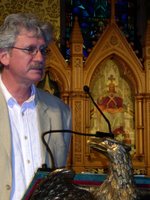Poet Spotlight: Reginald Gibbons
 August 15th's Rush Hour Concert features poems inspired by Bach's Two-Part Inventions. As a special treat, we are posting some of the poems that will be read during the concert. For insight into the process that led to this groundbreaking concert in partnership with The Poetry Foundation, please read our Artistic Director's earlier post.
August 15th's Rush Hour Concert features poems inspired by Bach's Two-Part Inventions. As a special treat, we are posting some of the poems that will be read during the concert. For insight into the process that led to this groundbreaking concert in partnership with The Poetry Foundation, please read our Artistic Director's earlier post.Reginald Gibbons served as the editor of TriQuarterly magazine from 1981 to 1997; during that time he published special issues of writing from
Piano Man, for Invention 5
In an old cabinet I found
something fine and long forgotten--
small carved chess pieces inside a
dark wood box, they belonged to my
uncle Witaly Jakob--but
in America called "V. J."
for Vitale Jacques, also "Vit"--
who lived fast: the first child, born just
before his parents quit Russian
Poland on their wandering way
here. His ear heard American,
raced his piano through silent-film
houses and white-jass bands, he made
recordings, rebelled against both
his TB and his doctors, in
1929 he died, his
Gershwin, his New Orleans club life
and two-hand speed ended, and this
wood box, once in his orbit, now's
among the many live objects
arrayed around me (as around
every lucky remembering
person) like the rock lumps and ice
chunks trailing the wide-orbiting
head of a fast-moving comet.
And even though I see on the
inside of the lid of the knife-
wrought wooden chess set Witaly’s
initials inscribed by his hand
with a twentieth-century
pencil that newly sharpened gave
off that still unchanged dry scent of
baked wood and graphite as Vit held
it--I see it, I see you, Vit--
and even though my gravity
keeps him with me, holds close the things
I write on when I write them on-
to pieces of paper with a
pencil, yet his chess set is one
more item that some day no one
will identify or care to
keep, an object the meaning of
which will evaporate when we
do or burn with unheard flame at
the end of our revolutions.

0 Comments:
Post a Comment
<< Home